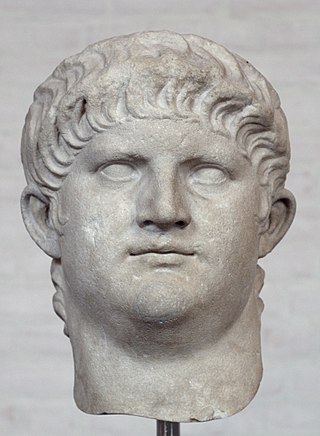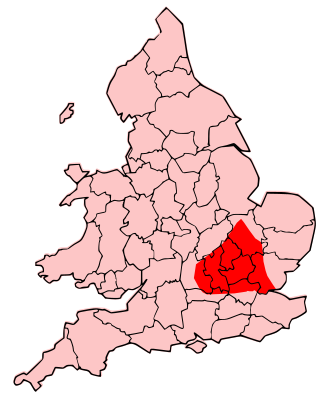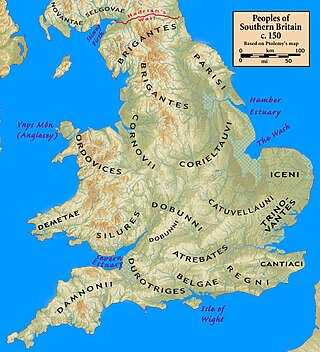Related Research Articles

Boudica or Boudicca was a queen of the ancient British Iceni tribe, who led a failed uprising against the conquering forces of the Roman Empire in AD 60 or 61. She is considered a British national heroine and a symbol of the struggle for justice and independence.

Nero Claudius Caesar Augustus Germanicus was a Roman emperor and the final emperor of the Julio-Claudian dynasty, reigning from AD 54 until his death in AD 68.

The 60s decade ran from January 1, AD 60, to December 31, AD 69.

AD 60 (LX) was a leap year starting on Tuesday of the Julian calendar. At the time, it was known as the Year of the Consulship of Nero and Lentulus. The denomination AD 60 for this year has been used since the early medieval period, when the Anno Domini calendar era became the prevalent method in Europe for naming years.

The Roman conquest of Britain was the Roman Empire's conquest of most of the island of Britain, which was inhabited by the Celtic Britons. It began in earnest in AD 43 under Emperor Claudius, and was largely completed in the southern half of Britain by AD 87, when the Stanegate was established. The conquered territory became the Roman province of Britannia. Attempts to conquer northern Britain (Caledonia) in the following centuries were not successful.

Gaius Suetonius Paulinus was a Roman general best known as the commander who defeated Boudica and her army during the Boudican revolt.

The gens Petronia was a plebeian family at ancient Rome. This gens claimed an ancient lineage, as a Petronius Sabinus is mentioned in the time of Lucius Tarquinius Superbus, the last of the Roman kings, but few Petronii are mentioned in the time of the Republic. They are frequently encountered under the Empire, holding numerous consulships, and eventually obtaining the Empire itself during the brief reign of Petronius Maximus in AD 455.

The Iceni or Eceni were an ancient tribe of eastern Britain during the Iron Age and early Roman era. Their territory included present-day Norfolk and parts of Suffolk and Cambridgeshire, and bordered the area of the Corieltauvi to the west, and the Catuvellauni and Trinovantes to the south. In the Roman period, their capital was Venta Icenorum at modern-day Caistor St Edmund.
Quintus Petillius Cerialis Caesius Rufus, otherwise known as Quintus Petillius Cerialis, was a Roman general and administrator who served in Britain during Boudica's rebellion and went on to participate in the civil wars after the death of Nero. He later crushed the rebellion of Julius Civilis and returned to Britain as its governor.

The Catuvellauni were a Celtic tribe or state of southeastern Britain before the Roman conquest, attested by inscriptions into the 4th century.
Prasutagus was king of a British Celtic tribe called the Iceni, who inhabited roughly what is now Norfolk, in the 1st century AD. He is best known as the husband of Boudica.
Publius Petronius Turpilianus was a Roman senator who held a number of offices in the middle of the 1st century AD, most notably governor of Britain. He was an ordinary consul in the year 61 with Lucius Junius Caesennius Paetus as his colleague.
Catus Decianus was the procurator of Roman Britain in AD 60 or 61. Tacitus blames his "rapacity" in part for provoking the rebellion of Boudica. Cassius Dio says he confiscated sums of money which had been given by the emperor Claudius to leading Britons, declaring them to be loans to be repaid with interest.

Gaius Julius Alpinus Classicianus was procurator of Roman Britain from 61 to his death in 65.

The Roman client kingdoms in Britain were native tribes which chose to align themselves with the Roman Empire because they saw it as the best option for self-preservation or for protection from other hostile tribes. Alternatively, the Romans created some client kingdoms when they felt influence without direct rule was desirable. Client kingdoms were ruled by client kings. In Latin these kings were referred to as rex sociusque et amicus, which translates to "king, ally, and friend". The type of relationships between client kingdoms and Rome was reliant on the individual circumstances in each kingdom.
Polyclitus was an influential freedman in the court of the Roman emperor Nero. He was sent to Britain in 60 or 61 AD to head an enquiry in the aftermath of the rebellion of Boudica. As a result the governor, Gaius Suetonius Paulinus, was relieved of his command and replaced by Publius Petronius Turpilianus.
Titus Flavius T. f. T. n. Sabinus was a Roman politician and soldier. A native of Reate, he was the elder son of Titus Flavius Sabinus and Vespasia Polla, and brother of the Emperor Vespasian.
Events from the 1st century in Roman Britain.
Publius Memmius Regulus was a Roman senator active during the reign of the emperor Tiberius. He served as consul suffectus from October to December AD 31 with Lucius Fulcinius Trio as his colleague, governor of Achaea from AD 35 to 44, and governor of Asia possibly in AD 48-49.

The Boudican revolt was an armed uprising by native Celtic Britons against the Roman Empire during the Roman conquest of Britain. It took place circa AD 60–61 in the Roman province of Britain, and it was led by Boudica, the Queen of the Iceni tribe. The uprising was motivated by the Romans' failure to honour an agreement they had made with Boudica's husband, Prasutagus, regarding the succession of his kingdom upon his death, and by the brutal mistreatment of Boudica and her daughters by the occupying Romans.
References
- 1 2 Palmer, Alan; Palmer, Veronica (1992). The Chronology of British History. London: Century Ltd. pp. 16–20. ISBN 0-7126-5616-2.
- ↑ Tacitus, Annals 14.30.
- ↑ Tacitus, Annals 14.31.
- ↑ Cassius Dio, Roman History 62.2.
- ↑ Williams, Hywel (2005). Cassell's Chronology of World History . London: Weidenfeld & Nicolson. p. 47. ISBN 0-304-35730-8.
- ↑ Tacitus, Annals.
- ↑ Cassius Dio, Roman History.
- ↑ Lawson, Russell M.; Services, Abc-Clio Information (2004). Science in the Ancient World: An Encyclopedia. ABC-CLIO. p. 193. ISBN 9781851095346.